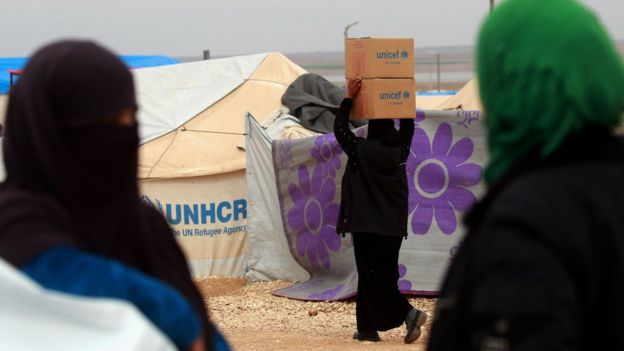Syrian Women ‘Made To Trade Sex For Aid’
Women in Syria have been sexually exploited by men delivering aid on behalf of the UN and international charities, the BBC has learned.
Aid workers said the men would trade food and lifts for sexual favours.
Despite warnings about the abuse three years ago, a new report shows it is continuing in the south of the country.
UN agencies and charities said they had zero tolerance of exploitation and were not aware of any cases of abuse by partner organisations in the region.
Aid workers told the BBC that the exploitation is so widespread that some Syrian women are refusing to go to distribution centres because people would assume they had offered their bodies for the aid they brought home.
One worker claimed that some humanitarian agencies were turning a blind eye to the exploitation because using third parties and local officials was the only way of getting aid into dangerous parts of Syria that international staff could not access.
The United Nations Population Fund (UNFPA) conducted an assessment of gender based violence in the region last year and concluded that humanitarian assistance was being exchanged for sex in various governorates in Syria.
It added: “Women and girls ‘without male protectors’, such as widows and divorcees as well as female IDPs (Internally Displaced Persons), were regarded as particularly vulnerable to sexual exploitation.”
Yet this exploitation was first reported three years ago. Danielle Spencer, a humanitarian adviser working for a charity, heard about the allegations from a group of Syrian women in a refugee camp in Jordan in March 2015.
She conducted a focus group with some of these women who told her how men from local councils in areas such as Dara’a and Quneitra had offered them aid for sex.
“They were withholding aid that had been delivered and then using these women for sex,” Ms Spencer said.

The spokesman added that any systematic abuse should be picked up by those monitors and reported to DfID.
An Oxfam spokeswoman said it had not been working with local councils delivering aid in the south of Syria in the run up to 2015 and was not doing so today.
“Our work inside Syria has been largely focussed on providing large-scale hardware for supplying water to Syrian communities rather than targeting aid at individuals or specific households,” she said.
“We did not receive reports about sexual exploitation around aid delivery in 2015, but have a zero tolerance policy on such abuse.”
A spokesman for the UNHCR said had been was aware of the allegations at the time but there had been insufficient information to identify and take action against any people or organisations.
However, he said the UNHCR had commissioned new research to find out more and additional efforts were made to strengthen prevention measures, reporting processes and training for local partners.
Source: BBC




Comments are closed.